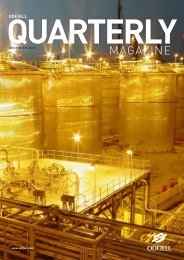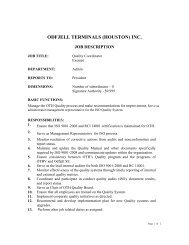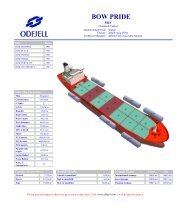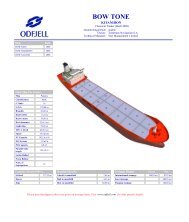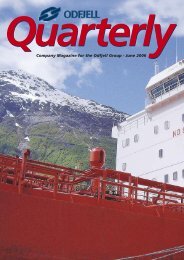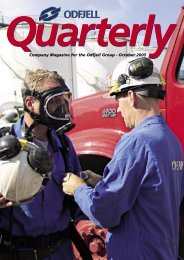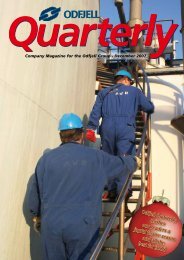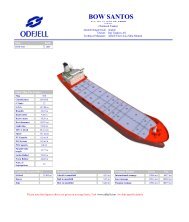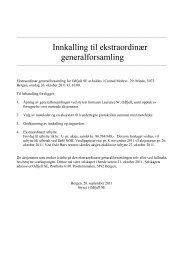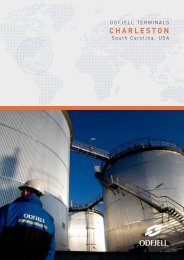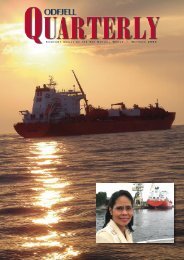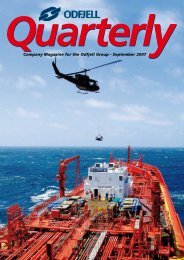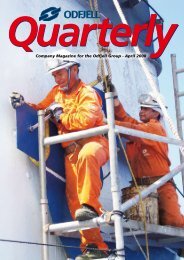Company Magazine for the Odfjell Group - March 2005
Company Magazine for the Odfjell Group - March 2005
Company Magazine for the Odfjell Group - March 2005
- No tags were found...
Create successful ePaper yourself
Turn your PDF publications into a flip-book with our unique Google optimized e-Paper software.
Dear Colleagues...<br />
On <strong>March</strong> 7th, <strong>Odfjell</strong> held a Board<br />
Meeting. For a CEO, Board Meetings<br />
are like passing an exam... The main<br />
topic <strong>for</strong> this particular meeting was<br />
to approve <strong>the</strong> final Financial<br />
Statements <strong>for</strong> 2004 and <strong>for</strong> <strong>the</strong><br />
Board to finalize <strong>the</strong> Directors’<br />
Report. Be<strong>for</strong>e so doing, <strong>the</strong> Board<br />
again addressed <strong>the</strong> issue of<br />
“Safety”, which is <strong>the</strong> first item on<br />
<strong>the</strong> agenda when <strong>the</strong> <strong>Odfjell</strong> Board<br />
convenes. This time I was happy to<br />
report that we have had no serious<br />
incidents or spills since <strong>the</strong> last<br />
meeting. The <strong>Odfjell</strong> Board of<br />
Directors supports <strong>the</strong> decision to<br />
concentrate, indeed to streng<strong>the</strong>n<br />
our work within HSSE, establishing<br />
Risk Management and Quality as a<br />
separate function; ano<strong>the</strong>r strong<br />
signal that we give HSSE high<br />
priority.<br />
I have previously described 2004 as<br />
one of <strong>the</strong> most dramatic years in <strong>the</strong><br />
history of <strong>Odfjell</strong>. Seen against this<br />
background, I think it is fair to say<br />
that we turned in a decent financial<br />
result. Our shareholders enjoyed a<br />
trebled share price, not at all because<br />
of particularly good results, but ra<strong>the</strong>r<br />
because of <strong>the</strong> promising market<br />
outlook.<br />
In this edition of <strong>Odfjell</strong> Quarterly,<br />
our Chairman makes some reflections<br />
on <strong>the</strong> increased newbuilding prices.<br />
Shipping has always been a fascinating<br />
industry; a competitive industry<br />
where freight rates are driven by supply<br />
and demand. No charterer asks<br />
about your costs, be that cost of capital<br />
or of operation. An example: At<br />
<strong>the</strong> peak of <strong>the</strong> tanker boom following<br />
<strong>the</strong> Suez crisis in 1973, a VLCC<br />
earned some US$ 400,000 per day in<br />
<strong>the</strong> spot market. Two years later <strong>the</strong><br />
same ship earned around US$ 3,000<br />
daily, owners went bankrupt and <strong>the</strong><br />
ships were laid up. In nei<strong>the</strong>r case<br />
did anybody ask about <strong>the</strong> owner’s<br />
cost. Admittedly, our risk profile is<br />
different from that of <strong>the</strong> VLCCowner<br />
referred to. Although a significant<br />
part of <strong>the</strong> cargoes carried by<br />
our chemical tankers is fixed in <strong>the</strong><br />
spot market, we normally have a<br />
portfolio of contracts of affreightment,<br />
securing a certain income and,<br />
importantly, a planned-<strong>for</strong> trading<br />
pattern. On <strong>the</strong> o<strong>the</strong>r hand, in addition<br />
to our industry being as capital<br />
intensive, our operations are generally<br />
much more complex than that of<br />
a VLCC-owner. Safe, reliable and<br />
efficient handling of more than 20<br />
million tonnes of cargo annually by<br />
about 9,000 parcels, requires qualified<br />
and trained people on board and<br />
on shore. It goes without saying that<br />
this costs lots of money.<br />
I know we have a lot of skilled people<br />
in our organization worldwide. Still<br />
it is a fact, however, from time to<br />
time we make mistakes that are<br />
causing extra costs. What is more<br />
concerning and disappointing is that<br />
<strong>the</strong> reported LTIF (Lost Time Injury<br />
Frequency) increased last year, after<br />
several years of steady improvement.<br />
Hence, our goals and objectives were<br />
not met. With <strong>the</strong> corrective actions<br />
taken, including <strong>the</strong> Corporate Safety<br />
Initiative, I trust we will turn around<br />
any such tendency. The ultimate and<br />
clear ambition <strong>for</strong> <strong>Odfjell</strong> is to be a<br />
zero-accident company!<br />
I believe we are well positioned to<br />
meet future challenges. Let us make<br />
year <strong>2005</strong> <strong>the</strong> year of improvements<br />
in all respects. Each and all of us can<br />
contribute towards achieving <strong>the</strong>se<br />
goals. The market outlook is promising,<br />
<strong>the</strong> more so since safer and<br />
operationally less challenging cargoes,<br />
such as clean petroleum products<br />
and even vegoils, are good<br />
alternatives to chemicals. In its<br />
Report <strong>for</strong> 2004 <strong>the</strong> Board of<br />
Directors expresses an optimistic<br />
view: “We expect a strong chemical<br />
tanker market <strong>the</strong> next few years as<br />
well as continued solid results in our<br />
tank terminal business.”<br />
Have a safe voyage!<br />
Bergen, <strong>March</strong> 8th <strong>2005</strong><br />
Terje Storeng, President/CEO<br />
ODFJELL Quarterly <strong>March</strong> <strong>2005</strong> 3



